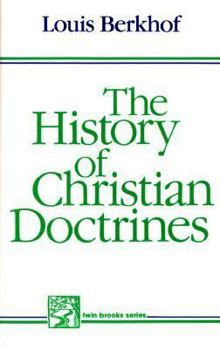History of Christian Doctrines
Select Format
Select Condition 
Book Overview
The Historical Volume of what was originally called Reformed Dogmatics now appears with a new title, namely, History of Christian Doctrines. Works on the gradual development of theological truth in... This description may be from another edition of this product.
Format:Paperback
Language:English
ISBN:0801006368
ISBN13:9780801006364
Release Date:February 1983
Publisher:Baker Publishing Group (MI)
Length:285 Pages
Weight:0.92 lbs.
Dimensions:0.8" x 5.4" x 8.4"
Age Range:18 years and up
Grade Range:Postsecondary and higher
Related Subjects
Christian Books & Bibles Religion Religion & Spirituality Religious Studies TheologyCustomer Reviews
4 ratings
The History of Christian Doctrines
Published by Thriftbooks.com User , 15 years ago
The copyright on this book is 1939. On the title page we are told: "This volume is a companion volume to the author's "Systematic Theology" and contains the historical material to be used with that work." In a preface dated 1949, Berkhof says that this book was the "Historical Volume of what was originally called "Reformed Dogmatics"." So it sounds like "Reformed Dogmatics" was repackaged into the two books "The History of Christian Doctrines" and "Systematic Theology". The book under review is a synopsis of the positions held by "Christian" intellectuals on topics foundational to Christianity, i.e. dogma. It is as much an overview of the unorthodox as the orthodox. "The task of the History of Dogma is, briefly stated, to describe the historical origin of the dogma of the Church and to trace its subsequent changes and developments; or, in the words of Seeberg [Textbook of the History of Doctrines, Philadelphia, 1905, 2 vols., tr. Charles E. Hay], 'to show how the Dogma as a whole and the separate dogmas have arisen and through what course of development they have been brought to the form and interpretation prevailing in the churches of any given period'." (20) In the Prolegomena, Berkhof distinguishes between dogma and doctrine. "A doctrine is often the direct, naive, expression of a religious truth. It is not necessarily formulated with scientific precision and when it is, may be merely the formulation of a single person. A religious dogma, on the other hand, is a religious truth based on authority and officially formulated by some ecclesiastical assembly." (16) Dogmas, in this sense, are not found in Scripture. "They are the fruit of human reflection, the reflection of the Church, often occasioned or intensified by theological controversies." (16) In summary: "A dogma may be defined as a doctrine, derived from Scripture, officially defined by the Church, and declared to rest upon divine authority. This definition partly names and partly suggests its characteristics. Its subject-matter is derived from the Word of God and is therefore authoritative. It is not mere repetition of what is found in Scripture, but the fruit of dogmatic reflection. And it is officially defined by a competent ecclesiastical body, and declared to rest upon divine authority. It has social significance, because it is the expression, not of a single individual, but of a community. And it has traditional value, since it passes the precious possessions of the Church on to future generations." (19) Differences in determining dogma arise between the Roman Catholic Church and the churches of the Protestant Reformation. For the Reformers, "all truly religious dogmas derive their material contents from Scripture and from Scripture only. They do not recognize the unwritten word or tradition as a source of dogmas." (17) Dogma arises from the reflection on the "truths of revelation" by the "body of believers" and through the formulations of "competent representative bodies"
scholarly
Published by Thriftbooks.com User , 15 years ago
It is interesting to see that there is someone who actually dug deep into the principles of christianity with an academia's mindset. He is excellent even if we do differ on some points of dogma. Anyway, its a book worth having because it unveils many things and gives you challenges to research and expand the vocabulary.
Companion book
Published by Thriftbooks.com User , 23 years ago
This book is a companion to Berkhof's Systematic Theology. I noticed one reviewer said if you wanted theology get his Systematic Theology instead. I say get them both and use them together (like they were intended to be used) and you will be enriched in your understanding of both Reformed theology and its history.
Quick Review
Published by Thriftbooks.com User , 24 years ago
Brief overview of the development of the major doctrines of historic Christianity.A great little book for the intended purpose. Also try JND Kelly's "Early Christian Doctrines" for more information on this topic of study.






